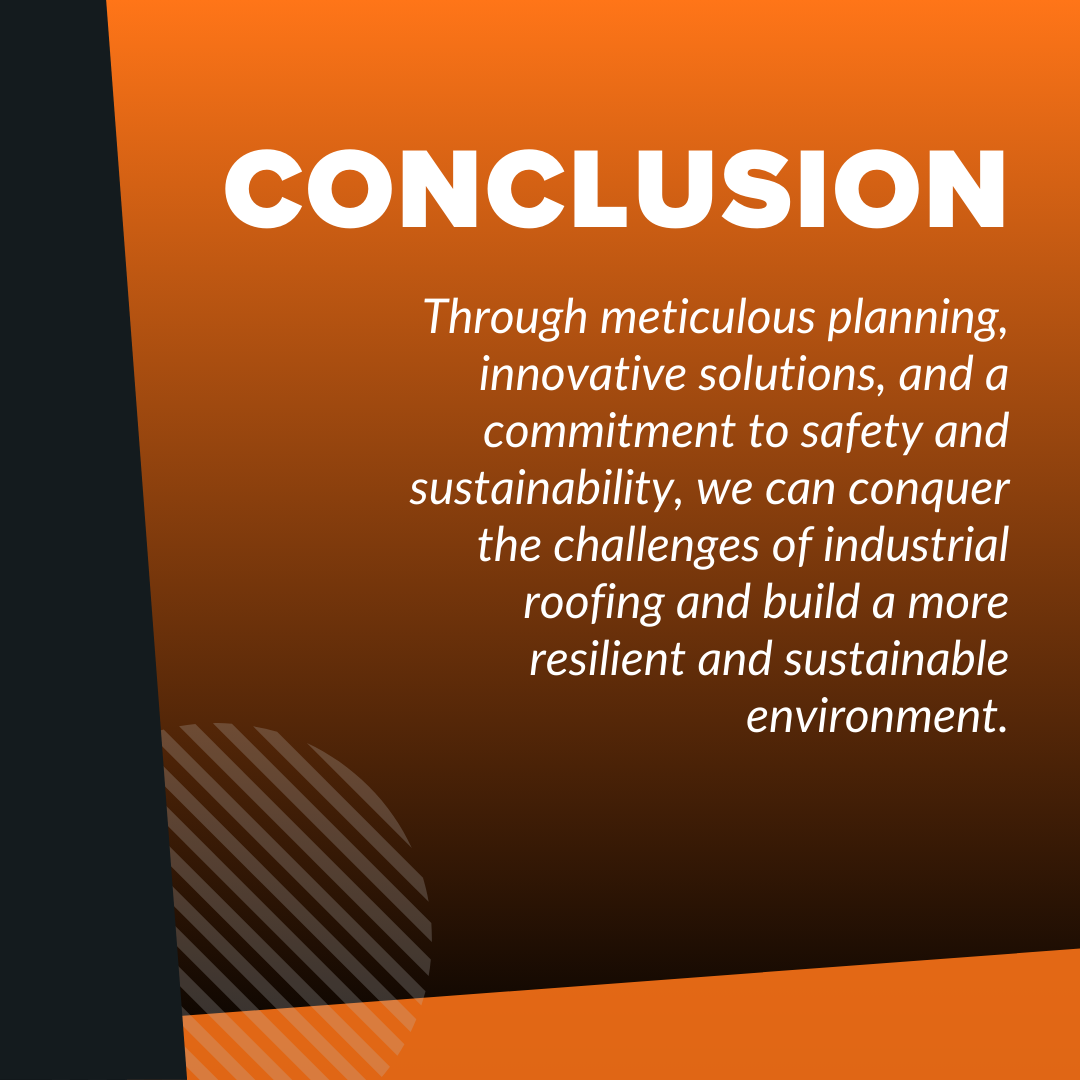January 7, 2025
Industrial Roofing Project Challenges
Let’s face it, tackling an industrial roofing project can feel like a daunting climb. These massive structures present unique and complex challenges that can make even the most seasoned roofers scratch their heads.
First off, Mother Nature can be a real party pooper. Imagine facing howling winds, torrential rain, or even a hail storm while trying to get the job done. These extreme weather conditions can wreak havoc on your materials and put your crew at risk.
Then there’s the safety factor. Working at those dizzying heights can be nerve-wracking, to say the least. Falls, slips, and even the risk of electrocution are real concerns.
And let’s not forget about the budget. Industrial roofing projects can be seriously expensive. Balancing the need for high-quality materials with cost constraints can feel like a tightrope walk.
Logistical challenges also abound. Transporting heavy equipment and materials to the roof,
coordinating with the facility’s operations, and handling all that construction waste can become a logistical nightmare.
But don’t worry, we’ve got this! To conquer these challenges, let’s get strategic, get to work, and conquer that roof!
The Summit of Roofing Industry Challenges

1. Weathering the Storm
Industrial roofs are constantly battling the elements. Imagine the relentless pounding of heavy rain, the ferocious gusts of wind, the punishing hailstorms, and even the weight of heavy snow.
Asphalt shingles are a popular and versatile roofing option. However, they are particularly vulnerable to weather damage, especially after storms. These extreme weather conditions can wreak havoc on the system, causing roof leaks, punctures, and premature wear and tear.
2. Safety at Heights
Working on these towering structures inherently involves significant safety risks. Falls, slips, and trips are ever-present dangers. Implementing safety measures such as using protective equipment like plywood and tarps and ensuring thorough cleanup to prevent damage from debris and heavy equipment is crucial.
In addition, there is the potential for exposure to extreme temperatures, hazardous materials, and even electrocution, and it becomes clear that safety must be the utmost priority.
3. Budgeting the Ascent
Industrial roofing projects often represent significant investments. Balancing the need for high-quality, durable materials with budget constraints can feel like a tightrope walk. Cutting corners can lead to costly repairs, while overspending can jeopardize the project’s profitability and lead to improper installation.
4. Logistical Labyrinth
Navigating the logistics of an industrial roofing project can be a true test. A reputable roofing company plays a crucial role in managing these logistical challenges. Transporting heavy equipment and materials to the roof, coordinating work around ongoing facility operations, and efficiently managing construction waste all present significant logistical hurdles.
Hiring a qualified roofing contractor is essential for ensuring smooth logistical coordination and addressing any unexpected issues that may arise.
5. Environmental Impact
Every industrial roofing project impacts the environment. Therefore, it's crucial to minimize this impact and prioritize eco-friendly practices, from the selection of materials to the disposal of construction waste.
Charting the Course to Success

1. Weatherproofing the Summit
Material Mastery: Choose roofing materials designed to withstand the harshest weather conditions. Consider high-performance materials like TPO, EPDM, or metal roofing systems, which offer enhanced durability and weather resistance.
Additionally, carefully planning the installation process is crucial to avoid weather-related delays and ensure safety, especially in areas with unpredictable weather like North Carolina.
Drainage Design: Implement a robust drainage system with scuppers, drains, and proper ventilation to prevent water buildup and ensure efficient water runoff.
Regular Check-ups: Conduct roof inspections to identify and address potential issues promptly. This proactive approach can prevent minor problems from escalating into major repairs.
2. Safety First, Always
Safety Training: All personnel involved in the project will receive comprehensive safety training, emphasizing fall protection, hazard recognition, and emergency procedures.
Safety Equipment: Ensure appropriate safety equipment, including harnesses, fall arrest systems, safety nets, and personal protective equipment (PPE).
Regular Safety Audits: Conduct regular safety audits and implement corrective measures to address identified safety hazards.
3. Budgeting Wisely
Life-Cycle Cost Analysis: Conduct a thorough life-cycle cost analysis to evaluate the long-term costs of various roofing options, considering energy efficiency, maintenance requirements, and potential for
future upgrades.
Competitive Bidding: Obtain competitive bids from reputable roofing contractors to ensure the best value for your investment.
Value Engineering: Explore value engineering techniques to identify cost-effective alternatives without compromising quality or performance.
4. Navigating the Logistics
Planning and Coordination: Develop a detailed project plan that addresses logistical challenges, including equipment access, material delivery, waste disposal, and coordination with facility operations.
A professional roofing contractor can manage these logistical challenges effectively, ensuring smooth project execution.
Technology Integration: Utilize advanced technologies such as drones and 3D modeling to improve project planning, assess roof conditions, and optimize workflow.
Efficient Waste Management: Implement a comprehensive waste management plan to minimize construction waste and maximize recycling and reuse of materials.
5. Environmental Stewardship
Eco-Friendly Materials: Choose environmentally friendly roofing materials, such as recycled or recyclable options. Maintaining structural integrity while selecting these materials is crucial to ensure the building's functionality and appearance are not compromised.
Sustainable Practices: Minimize energy consumption during construction and implement measures to reduce the project's environmental impact.
Local Partnerships: Collaborate with suppliers, property owners, and waste management companies to promote sustainable practices throughout the project lifecycle.
You must take a look at this: Top 10 Myths About Roofing Software Debunked
Conclusion

Successfully navigating the complexities of industrial roofing challenges, including roof replacement, requires careful planning and a multifaceted approach. The industry demands expertise to address its unique roofing problems, such as unexpected weather delays and unforeseen structural problems.
Experienced professionals on your team are crucial to effectively navigating these challenges.
Through meticulous planning, innovative solutions, and a commitment to safety and sustainability, we can conquer the challenges of industrial roofing and build a more resilient and sustainable environment.
Sunbase Roofing Software
Running a roofing business is about expertly managing every moving part that keeps everything running smoothly.
Sunbase's Best roofing software provides technical support for managing every detail, from tracking leads to handling the final inspection. It makes estimating easier, keeps your team organized, and ensures projects stay on track and within budget for the roofing professionals.
You must know this: Top 5 Reasons to Choose Sunbase Roofing Software for End-to-End Project Management.
Contact Us
Want smoother operations and faster project completion? Let Sunbase Roofing Software handle the heavy lifting with its technical expertise while you focus on what really matters! Get on Board and Transform Your Roofing Projects Today!
Frequently Asked Questions
1. How can I ensure the safety of my workers during an industrial roofing project?
Prioritize safety training and provide adequate safety equipment. Conduct regular safety audits and implement corrective measures.
2. What are some cost-effective strategies for an industrial roofing project?
Conduct a life-cycle cost analysis and explore value engineering. Obtain competitive bids from reputable contractors.
3. How can I prepare for unexpected weather challenges during the project?
Select weather-resistant materials and implement a robust drainage system. Develop a contingency plan to address potential weather delays.
I agree to receive marketing messaging from Sunbase at the phone number provided above. I understand data rates will apply, and can reply STOP to OPT OUT.







